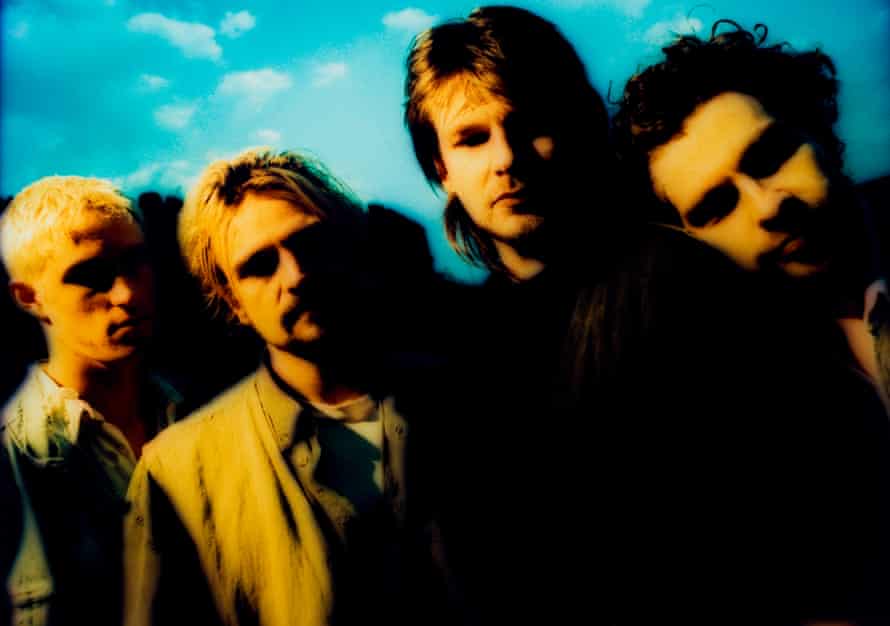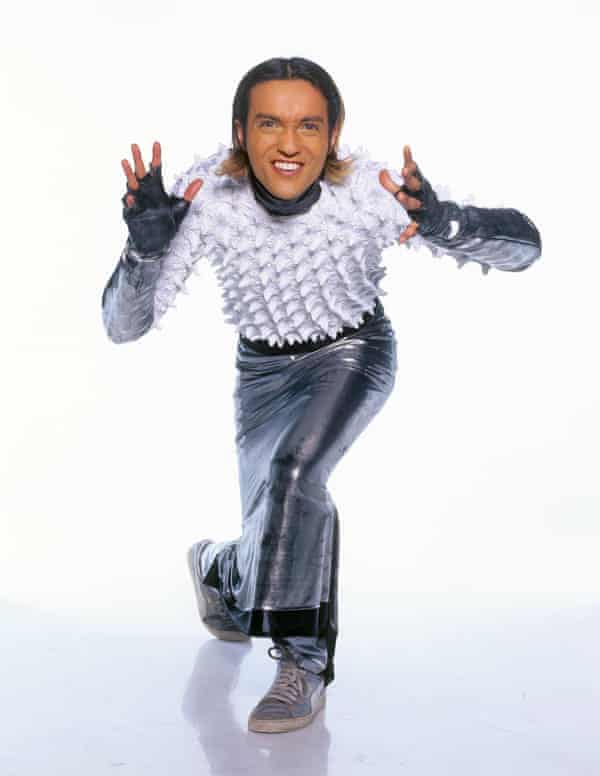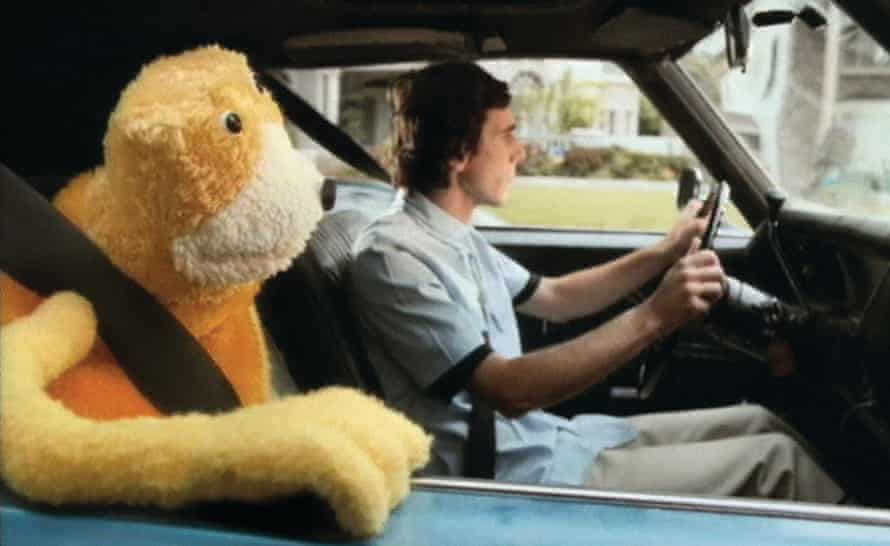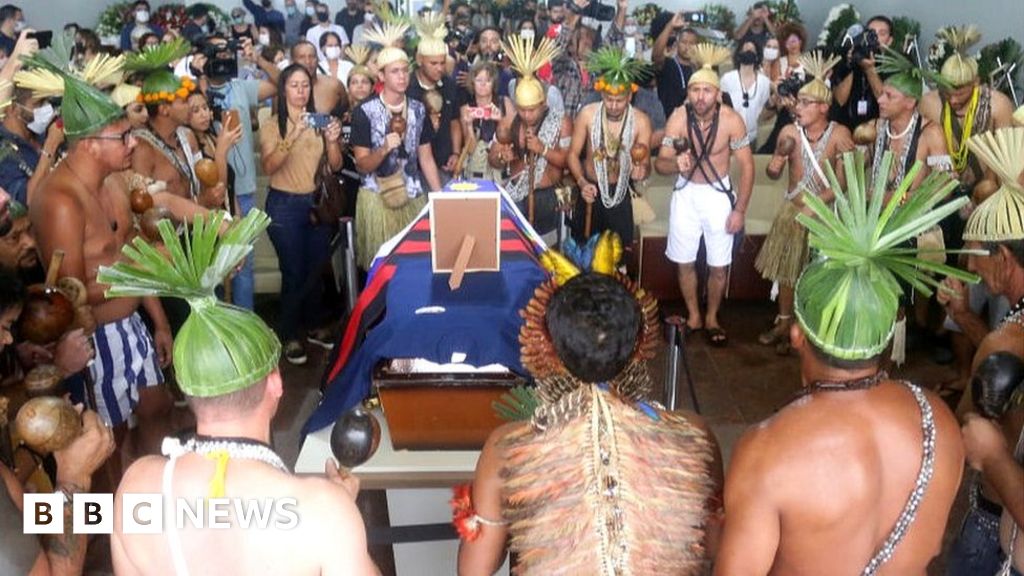[ad_1]
Amid black and white Ansel Adams-style cinematography, two Amish sisters spy on a topless man bathing in a Yosemite river. Out of the blue, a peaceable choral soundtrack gave offers strategy to bone-shaking guitar: Inside, the debut single by Scottish grunge band Stiltskin.
Thus started one of many strangest cultural wrinkles of the Nineteen Nineties: when Levi’s grew to become a denims firm that might additionally rating UK chart hits. Inside was constructed round an addictive riff that also sounds recent, and the advert, entitled Creek, shot it to the highest of the UK charts. Over the subsequent few years, the likes of Babylon Zoo, Smoke Metropolis, Mr Oizo and Norman Cook dinner’s pre-Fatboy Slim undertaking Freak Energy would additionally rating main success off the again of a placement in Levi’s witty, usually sexually provocative adverts.
Earlier than Stiltskin, earlier Levi’s adverts had made renewed hits out of Muddy Waters’ Mannish Boy, the Conflict’s Ought to I Keep or Ought to I Go and Marvin Gaye’s I Heard It By the Grapevine (the latter in 1985’s traditional, Nick Kamen-in-his-boxers “Laundrette” advert). The model used traditional blues, rock and soul to embody the model’s sense of classic authenticity. Inside, although, was the primary time the corporate had used a brand new artist as their soundtrack.
“Whenever you’re promoting the identical primary product on this planet of style, you need to change one thing,” explains Sir John Hegarty, the inventive director at London-based inventive company Bartle Bogle Hegarty (BBH), who ran the 80s and 90s Levi’s campaigns. “You possibly can’t change the garments. So we used the communication as a approach of claiming: we’re discovering music, we’re forward of style.”

“My home was being repossessed as a result of I couldn’t pay the mortgage,” says Stiltskin singer (and later Genesis vocalist) Ray Wilson, recalling his audition for the band in January 1994. “I signed on the dole and drove right down to London on this outdated Volkswagen van that was falling aside. Weeks after, we have been No 1.” Launched 20 days after Kurt Cobain’s suicide, the track landed in a musical panorama overrun with grunge bands emulating the 90s Seattle sound. Smashing Pumpkins frontman Billy Corgan, satisfied Inside ripped off their sound, greeted a Munich crowd later that 12 months with a wry, “Hello, we’re Stiltskin!”
The band by no means had one other hit, one thing Wilson chalks as much as “an excessive amount of success too rapidly. You possibly can’t go up from there – it’s not one of the simplest ways to start out a band’s profession. We got here collectively inside weeks, so we didn’t have a relationship. We ended up hating one another.” That anger bled into the band’s performances. “We did MTV’s Most Wished and we have been instructed there was one thing within the area of 20 million viewers,” he continues. “Me and [guitarist and songwriter] Peter have been at one another. He kicked me within the face. On one hand MTV have been pissed off, however that little clip of Peter kicking me and the microphone flying out of my hand – they used that for 12 months on their trailers.”
Having your monitor chosen by Levi’s was sufficient to no less than assure a chart hit, albeit not longevity – however even fleeting success was a temptation. “The music trade went from: ‘I don’t wish to contact promoting’, to utterly swinging spherical to: ‘Please can now we have a few of our music in your advert’,” remembers Hegarty.
“It was that winning-the-lottery cellphone name,” says Fatboy Slim, AKA Norman Cook dinner, who, in 1995, was taking part in keyboards in acid-jazz troupe Freak Energy. “We have been slogging round golf equipment taking part in gigs and albeit, we weren’t setting the world alight. We wanted one thing to kick us up a division.”
Flip On, Tune In, Cop Out had reached No 29 when it was first launched, however went High 5 after being re-released and chosen to function within the 1995 Levi’s advert Taxi. The industrial confirmed Filipino-American clothier Zaldy, now higher identified for making RuPaul’s outfits on Drag Race, taking a New York taxi in drag, and stunning the cab driver by shaving her chin mid-drive. Airing at a time when there was little in the best way of LGBTQ+ illustration in promoting, it was nearly banned by the Promoting Requirements Authority, who lastly agreed it might be proven after 8pm. “The primary shopper [at Levi’s] on the time was like, ‘Oh my god, we are able to’t do that’,” remembers Hegarty. “The individuals beneath him needed to go and persuade him it was going to be nice.”
“There was one lower I actually favored the place the entire monitor stops when the shaver got here on, which additionally sounded form of like a vibrator,” says Cook dinner. “I used to be very happy with the very fact it had this barely risque subject material [for the time].”
Most individuals who grew up within the 90s will cite Babylon Zoo’s 1995 industrial-glam hit Spaceman because the Levi’s advert track they bear in mind finest. Though, as Hegarty reveals, the collaboration nearly didn’t occur. “[Vocalist Jas Mann] didn’t wish to do it and his supervisor mentioned, ‘Are you fucking silly? That is going to make you’.” It will go on to change into the fastest-selling British single because the Beatles’ Can’t Purchase Me Love, regardless of widespread disappointment that the pitched-up snippet within the advert wasn’t consultant of the general monitor. “Thousands and thousands of pop children rushed down Woolies and purchased the one – solely to get it house to find to their horror that it was ‘good’ (like within the advert) for about 10 seconds,” Steven Wells wrote within the NME. “Then grew to become garbage. Very garbage.”

Nonetheless, the Levi’s cachet continued to rise by the Nineteen Nineties, and BBH commissioned well-known names to helm their commercials. In 1997, Roman Coppola directed the Brady Bunch-inspired industrial Daytrippers, soundtracked by US indie band Lilys’ psych-pop monitor, A Nanny in Manhattan. The track reached No 16 within the UK – their solely main chart success. Vocalist Kurt Heasley remembers he felt pressured to comply with up with music individuals may “immediately grasp by the second refrain. We’re this bizarre, uncommon, odd factor and other people have been like, ‘Extra meat! Extra potato!’ We’re extra like truffle oil on chips.”
Additionally in 1997, Michel Gondry, who would later direct Everlasting Sunshine of the Spotless Thoughts and extra, was employed to movie the raunchy spot Mermaids. For Smoke Metropolis’s Brazilian-British vocalist Nina Miranda, Gondry’s sensual advert, which featured a pod of mermaids trying to alleviate a person of his Levi 501s within the ocean, conjured a way of escapism. “Levi’s adverts have been bizarre little messages in a bottle from an unique place elsewhere,” she says.
Miranda had written the monitor in 1993, lengthy earlier than Levi’s got here calling: “I used to be actually depressed and residing in London. I used to sit down in my room, placing concepts to tape. A DJ buddy mentioned: ‘I’m going to make a track only for you’. I put it on, with out having heard it earlier than, and I sang what I felt which was this unimaginable journey into water.” Underwater Love grew to become an underground hit and sparked a bidding struggle – however as soon as signed to Zumba Information, Smoke Metropolis have been annoyed to search out the label wouldn’t promote their debut album, Flying Away, after the Levi’s advert was confirmed, as a result of they thought-about the advert such an efficient advertising software by itself.
“We have been saying, ‘please promote the album’, as a result of already individuals have been saying we have been one-hit wonders,” Miranda remembers, although she believes the industrial was nonetheless a blessing reasonably than a curse. “That track went all around the world. It opened plenty of doorways and other people nonetheless bear in mind it.”
BBH’s ultimate Levi’s advert of the 90s could be their most profitable of the last decade. It featured a headbanging, fluffy yellow puppet referred to as Flat Eric. Soundtracked by Flat Beat, French DJ-producer Mr Oizo’s influential bass anthem, it was an idea Hegarty needed to pitch 3 times with the intention to recover from the end line. The one offered hundreds of thousands of copies, spent two weeks at No 1 in March 1999, and spawned suppose items that contemplated Flat Eric’s place on the intersection of consumerism and in style tradition.

However Flat Beat could be the final track to change into a serious hit after showing on a Levi’s advert and BBH turned away from utilizing authentic artists within the 2000s. That 90s run is a feat Hegarty thinks may by no means occur once more. “The best way promoting works immediately, it doesn’t have fairly the arrogance – or if I can use that phrase ‘swagger’ – because it had again then,” he says. “Individuals have misplaced confidence in these massive model statements about what we’re, who we’re, how we behave.”
“I suppose the trendy equal could be to have a TikTok hit,” says Cook dinner, who lately contemplated becoming a member of the social community along with his supervisor and label. “We went to TikTok and requested, ‘We all know get data on the radio, however how can we get them right here?’ They usually mentioned, ‘They only develop ergonomically or organically.’ It’s not an algorithm that may be influenced.”
The distinction, Hegarty says, is the best way that the world is fragmented immediately by social media. “There’s all the time a relationship between music and clothes – the difficulty is you’ve not received anybody going on the market making an enormous assertion about it and main the market,” he says. “Somebody all the time says to me, ‘How do you are expecting style?’ You possibly can’t predict style. What you are able to do is write attention-grabbing, difficult, distinctive little tales and that approach, you may need an affect.”
[ad_2]
Source link









